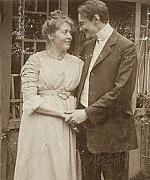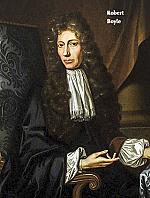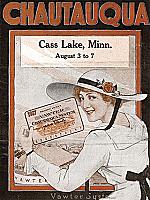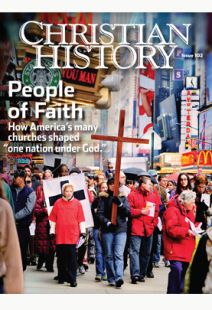People of faith: Recommended resources part 2
MANY RESOURCES EXIST TO HELP navigate the landscape of American Christian engagement with culture. Here are a few books, web resources, and articles from past issues of Christian History, to get you started. (You can access these articles most easily by going to the online version of this issue at www.christianhistorymagazine.org and clicking on the titles of the articles that interest you. For a list of all of CH’s back issues, see https://www.christianhistoryinstitute.org/magazine/issues/
Survey histories
• William McLoughlin, Revivals, Awakenings, and Reform: An Essay on Religion and Social Change in America, 1607–1977. Explores the relationship between revival awakenings and social reform movements in American history.
• John McGreevy, Catholics and American Freedom: A History. Studies the way Catholics have participated in American intellectual life and how they have both cooperated and conflicted with Protestants over various social issues.
Early settlement, colonial, and revolutionary periods
• Mark Galli, “Defeating the Conspiracy” (issue 62). “For decades all manner of people and circumstances conspired against African Americans even hearing the gospel, let alone responding to it in freedom and joy.”
• Justo González, “Lights in the Darkness” (issue 35). “It is true that the exploitation and immense cruelties of the [American] Conquest were done in the name of Christ, but it is also true that some in the same Name chose to live in solidarity with the exploited.”
• Will Gravely, “You Must Not Kneel Here” (issue 62). Recounts how Richard Allen, the first Christian bishop of African descent in North America, founded the Afri- can Methodist Episcopal Church, “one of America’s first truly independent black denominations.”
• The editors, “In the Wake of the Great Awakening” (issue 23). “The Awakening not only brought spiritual renewal to God’s people, and new conversions, but salt and light to the society around.”
• Wesley Roberts, “Rejecting the Negro Pew” (issue 45). “Discrimination motivated blacks, where possible, to organize their own churches, though white leaders actively opposed that.”
• Harry Stout, “Preaching the Insurrection” (issue 50). Explores the power of the sermon in colonial America: “Angry colonists were rallied to declare independence and take up arms because of what they heard from the pulpit.”
Nineteenth century
• Daniel Dreisbach, “The Wall of Separation” (issue 99). “The rancorous presidential election of 1800 brought religion to the forefront of public debate and had lasting repercussions for the relationship between church and state.”
• Jennifer Graber, The Furnace of Affliction: Prisons and Religion in Antebellum America. This history of Protestant involvement with prison reform focuses on the many ways in which the reformers’ ideals ultimately failed.
• Vincent Hardin, “God’s Avenging Scourge” (issue 62). “Nat Turner’s rebellion, the bloodiest in slave history, was driven by his prophetic visions.”
• William Kostlevy, “Saving Souls and Bodies” (issue 82). “For some critics, the term ‘holiness movement’ has conjured images of navel-gazing holy rollers. This caricature is simply not accurate. The movement’s most enduring legacy is a nationwide network of missions to the socially and economically disadvantaged … ”
Timothy Miller, Following in His Steps: A Biography of Charles M. Sheldon. The novel In His Steps (1897) famously urged social engagement on Protestant churchgoers. This biography of its author highlights his own social involvement.
• Ted Olsen, “By Any Means Necessary” (issue 62). “Black abolitionists were tired of waiting for a gradual peaceful end to slavery.”
• Gari-Anne Patzwald and William Kostlevy, “From Mutual Aid to Global Action” (issue 84). Recounts the history of Anabaptist mutual aid and service ministries.
• Albert Raboteau, “The Secret Religion of the Slaves” (issue 33). “By the eve of the Civil War, Christianity had pervaded the slave community.”
• Dana Robert, “The Mother of Modern Missions” (issue 90). “By bravely going where no American wife had gone before, Ann Hasseltine Judson inspired generations of women to become missionaries.”
• BruceShelley, “Counter-CultureChristianity” (issue 45). Examines how Christians before the Civil War participated in social experiments where they “agreed to hold their property in common, just as the apostles had apparently done in early Judea … [and] insisted that God called for a distinctive people reflecting the kingdom of God in all essentials of economic and family life.”
• Timothy Smith, Revivalism and Social Reform: American Protestantism on the Eve of the Civil War. This is one of the first modern scholarly books to systematically and sympathetically treat religious motivations for nineteenth-century social reform.
• Tim Stafford, “The Abolitionists” (issue 33). “After the Civil War, abolitionists were lionized. Then, soon, they were forgotten. They still are.”
• Harry Stout, Upon the Altar of the Nation: A Moral History of the Civil War. Explores the dark side of religious social engagement, describing how both North and South justified themselves through the idea that they were involved in a sacred cause.
• Ferenc Morton Szasz, “Preparing a Way in the Wilderness” (issue 66). “Though history has all but forgotten them, it was Christian preachers and teachers who really tamed the west.
• Jennifer Woodruff Tait, The Poisoned Chalice: Eucharistic Grape Juice and Common-Sense Real- ism in Victorian Methodism. Explores the theological motivations behind the efforts of evangelicals to reform many lifestyle issues in nineteenth-century America, especially temperance advocacy.
• Michael Young, Bearing Witness against Sin: The Evangelical Birth of the American Social Movement. Explores nineteenth-century evangelical involvement in social reform issues and the religious motivation behind many of these reforms.
Twentieth and twenty-first centuries
• David Daniels, “They Had a Dream” (issue 58). Describes how some early Pentecostals hoped to bring blacks and whites together.
• David Goetz, “The Monkey Trial” (issue 55). “Like the O. J. Simpson trial in our day, the [Scopes] case itself set no significant precedents, but it revealed a widening chasm in America, and in American Christianity.”
• James Goff, “Peaceniks” (issue 58). “Early Pentecostals asked, Why go to war when Jesus is on his way?”
• Collin Hansen, “The Politics of Service” (issue 92). “A profile of three Christian activists who drew on faith to fight social challenges.”
• Edward Larson, Summer for the Gods: The Scopes Trial and America’s Continuing Debate over Science and Religion. Describes the clashing visions of social engagement on display in the 1925 Scopes trial over the teaching of evolution.
• George Marsden, “The Born-Again Mind” (issue 92). “Harold John Ockenga’s conviction that the church needs thinkers helped spark a renaissance of evangelical scholarship.”
• George Marsden, Fundamentalism and American Culture. Shows the roots of fundamentalism in nineteenth-century American evangelicalism and revivalism, and describes both fundamentalists’ problems with modern America and their impact on it.
• Charles Marsh, God’s Long Summer: Stories of Faith and Civil Rights. Focuses on the role of religion in motivating the twentieth-century civil rights moment.
• Richard Mouw, “Awakening the Evangelical Conscience” (issue 92). “The New Evangelicals called for a fresh application of Christian truth to the social problems of the day.”
• Mark Noll, “The Most Democratic Book in the World” (issue 99). “Theodore Roosevelt and Woodrow Wilson were champions of both the Bible and progressive reform.”
• Howell Raines, My Soul Is Rested. The Story of the Civil Rights Movement in the Deep South. Presents the personal recollections of the faith and struggles of many involved in the civil rights movement, as well as the voices of some members of their opposition.
• David Roebuck, “Who Were the ‘Fundamentalists’?” (issue 92). “The vast majority of evangelicals, however, stayed with the mainline and tried to purify their churches from within. By the early 1910s, they formed a massive, cross-denominational movement for reform . . . ” CH
By the editors
[Christian History originally published this article in Christian History Issue #102 in 2012]
Next articles
“Our garden must be God’s garden”
The Bruderhof sought a life in harmony with God and nature
Charles E. MooreA cathedral, a retreat, a challenge
American Methodists worshiped in God’s creation even as they looked to the world beyond
Russell E. RicheyHeaven under our Feet
What did the son of a pencil-maker have in common with the Transcendentalists?
Jennifer Woodruff Tait






